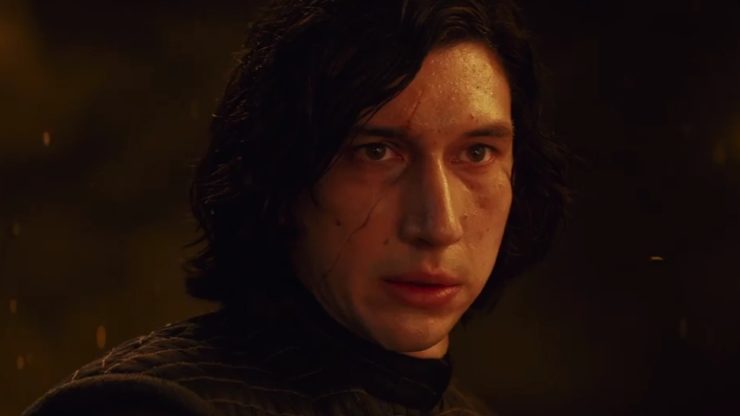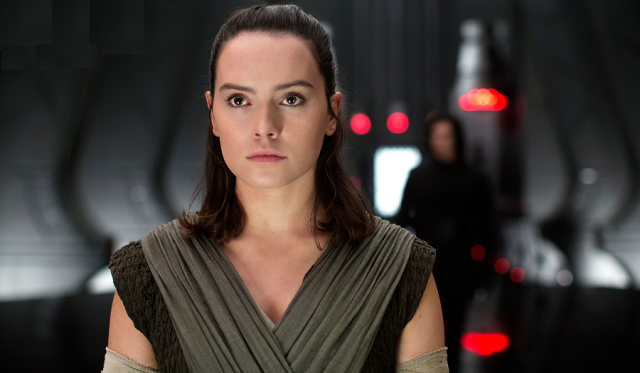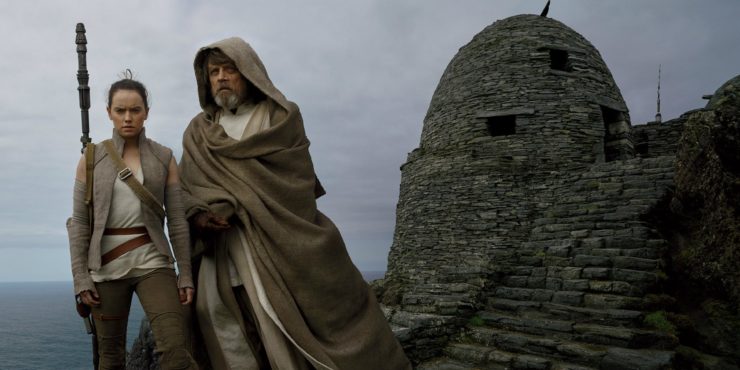There’s a saying, attributed to the Greek philosopher Heraclitus, that says “you cannot step in the same river twice.” It’s a quote I’ve been thinking about a lot about since watching (and re-watching, and re-watching) The Last Jedi.
A lot has been said about the latest Star Wars film and its relationship to the past. Some people are firmly of the mindset that The Last Jedi ruined what’s come before, in terms of key elements like our understanding of the Force to the treatment of Luke Skywalker. Others say that the film marks an important pivot for the franchise as it respectfully moves away from its long, detailed history and charts a new future. Still others contend that nostalgia is a dangerous thing, and the purpose of The Last Jedi was to gleefully destroy everything that’s come before it.
While I certainly believe that two of these interpretations are wildly inaccurate, I’m not here to throw my own opinion into that fray, even though, after my first viewing, my feelings about what The Last Jedi accomplished were very confused. Like all of Rian Johnson’s movies, The Last Jedi is remarkably dense, and that density is only made heavier by the baggage that all of us Star Wars fans bring to each and every one of these films (myself included). It took some effort, and a good amount of thought, for me to strip away my own preconceptions of what Star Wars is and should be in order to read The Last Jedi as a text that exists outside of myself. When I did, I realized the central point of the story was simple—
The only way out is forward.
[Beware spoilers ahead!]
The Last Jedi, without a doubt, is engaged in an interesting conversation with the past. And that conversation is defined by how almost every character in the film is trapped by being forced into doing what’s already come before. For example: in her actions (which carry over from The Force Awakens), Leia is literally repeating what she’s already done before, sending out a desperate call to the galaxy’s last remaining Jedi. She might as well as have instructed Rey to say, “Help me Luke Skywalker, you’re my only hope.” It’s with intention, of course, that R2-D2’s signature message is played to Luke; everyone is expecting him to be this lone savior, even though the very notion is ridiculous—and Luke knows it.

“You think I’m going to walk out there with a laser sword and take down the entire First Order?” he asks Rey. And Rey, for her part, would have answered yes had she been given the chance, because that’s exactly what she’d been told—more or less—that Luke was supposed to do. It’s what we, as the audience, expect him to do. We expect Luke to rise to the occasion, we expect him to train Rey and pass down the mantle the way Yoda and Obi-Wan passed it to Luke. And we’re not wrong for thinking that way. Not only is that mythology baked into the Star Wars story, but The Force Awakens pretty much created the conditions for this expectation—amongst other expectations—to be formed.
Put plainly: Just like the characters, we as an audience expected the past to happen again. But that can’t be. On the most fundamental level, if the past was worth reenacting, that means the past had gotten it right—otherwise, why go back to it? But the past wasn’t perfect, nor should we expect it to be. The past gave the galaxy the First Order and Kylo Ren; it gave the galaxy a Resistance that wasn’t strong enough, wasn’t inspiring enough to rally a single ally to its side in its most desperate hour. Does that diminish everything that had been accomplished previously? Of course not. Everything that Luke, Leia, Han, Lando, and the entire Rebellion achieved still stands; they are, and always will be, heroes. But they weren’t perfect, and to try and recreate the past’s triumphs is also to recreate their mistakes. That’s where the beating heart of The Last Jedi lies, in understanding that the greatest power is in finding your own way, and not trying to repeat what’s already been done.

This power is markedly contrasted by Kylo Ren and Snoke, who fetishize the past more than anyone else in the film. Snoke is obsessed with fashioning himself into Emperor Palpatine 2.0. He keeps guards who are knockoffs of the emperor’s royal guards; he goes through unimaginable lengths to transform Ben Solo into his own version of Darth Vader; and he’s so obsessed with destroying Luke Skywalker—one man—that the very plot he enacts to learn his enemy’s location leads to his downfall. A lot of people have argued about Snoke’s treatment, and how viewers were robbed by not being told how he became so powerful and started the First Order. Contesting that, other fans have argued that Snoke’s history doesn’t matter because we know as much about him as we knew about Palpatine in the original trilogy. I say something different: I say we don’t need to know anything about Snoke because there’s nothing to know. He’s nothing more than a facsimile of the past; that is who he is. That’s what’s more salient to the point of the film—not his power, but his weakness. And his weakness is in wanting to do what’s already been done and refusing to learn from someone—Palpatine—who failed.
Kylo Ren is similarly trapped in this toxic relationship with what’s come before. Sure, he claims he wants to “let the past die,” but that’s only to the end of making the past his own, similar to Snoke. He wants to continue the same power cycle. It doesn’t matter that Vader turned good and the Empire was defeated; he doesn’t want to see the past’s failures, he only wants to idolize it and repeat it. Ren wants to destroy the past the same way Vader does when he tries to convince Luke to join him in overthrowing the Empire—neither wanted to create anything new; they wanted to do the same thing, maintain the status quo, just with them in charge. And then, inevitably, someone else would usurp them, and so on and so on. It’s no accident that, when Hux discovers that Snoke’s dead (killed by his apprentice—literally the same way Palpatine met his end), he’s forced to say, in so many words, “The Supreme Leader’s dead, long live the Supreme Leader.” Because not a single thing has changed. Not really.

But our heroes, on the other hand, learn not to reject the past—they learn to embrace it, warts and all, and carve a new path forward. “We are what they grow beyond,” Yoda tells Luke, and it’s a message that speaks to mentor and student, past and future. We never want our students, our children, to become what we already were. We want them to grow and evolve, and the only way to do so is by being honest about the mistakes that were made. It’s the lesson Luke learns in understanding that just because the past was wrong in some ways doesn’t mean it needs to be completely discarded; just because he made a mistake doesn’t mean that he has nothing left to offer. Embracing the past, all of it, is the only way to grow.
Similarly, it’s the lesson Rey learns in relinquishing the belief that the identity of her parents somehow defines who she’s supposed to be, who she can be. She’s not limited to that, nor is she limited to reenacting the same tropes that have already been played out by others. Rey already has everything she needs, Yoda tells us, and by the end of the film, we see someone who is no longer looking to Luke to reveal her purpose, no longer looking to Kylo Ren to have a change of heart and save the galaxy (just like Luke and Vader); she’s no longer looking to the past to instruct her future. She—and the newly reborn Rebellion—are free to make their own triumphs and, inevitably, their own mistakes.
In all of this, The Last Jedi delivers a profound message that helps us understand that part of what makes evil evil is its refusal to evolve—its refusal to accept new ideas, new ways of doing things. Rather, it wants to replicate what’s come before, not knowing that you can never step in the same river twice. The river has changed; it has moved on. Luckily, the heroes learn this lesson, and they’ve stepped out of the river and toward new terrain.
 Michael Moreci is a comics writer and novelist best known for his sci-fi trilogy Roche Limit. His debut novel, Black Star Renegades, is available now. Follow him on Twitter @MichaelMoreci.
Michael Moreci is a comics writer and novelist best known for his sci-fi trilogy Roche Limit. His debut novel, Black Star Renegades, is available now. Follow him on Twitter @MichaelMoreci.










